12 Best Brandwatch Alternatives for Social Media Analysis
Discover 12 top Brandwatch alternatives for social media analysis. Find tools that fit your needs and budget with ease.

In the fast-paced world of social media, trends come and go in the blink of an eye—one moment, you're on top of the world, and the next, you're scrambling to keep up with the competition. When you think you've gotten a handle on things, the algorithm changes, leaving you with tons of content and no idea how to make it relevant again.
So, how to find social media trends? One of the best ways to boost your chances of staying on trend is to keep up with the trends. This is where a social media trend tracker comes in. You've come to the right place if you're looking for a solid Brandwatch alternative. This guide will help you identify some of the best alternatives to Brandwatch for tracking social media trends so you can get back to business and achieve your viral goals.
One particularly effective tool for tracking social media trends is Virlo's virality analysis tool. This tool helps you analyze existing content to uncover trends and patterns that can inform your future content strategy and help you go viral.
Table of Contents
What is Brandwatch?
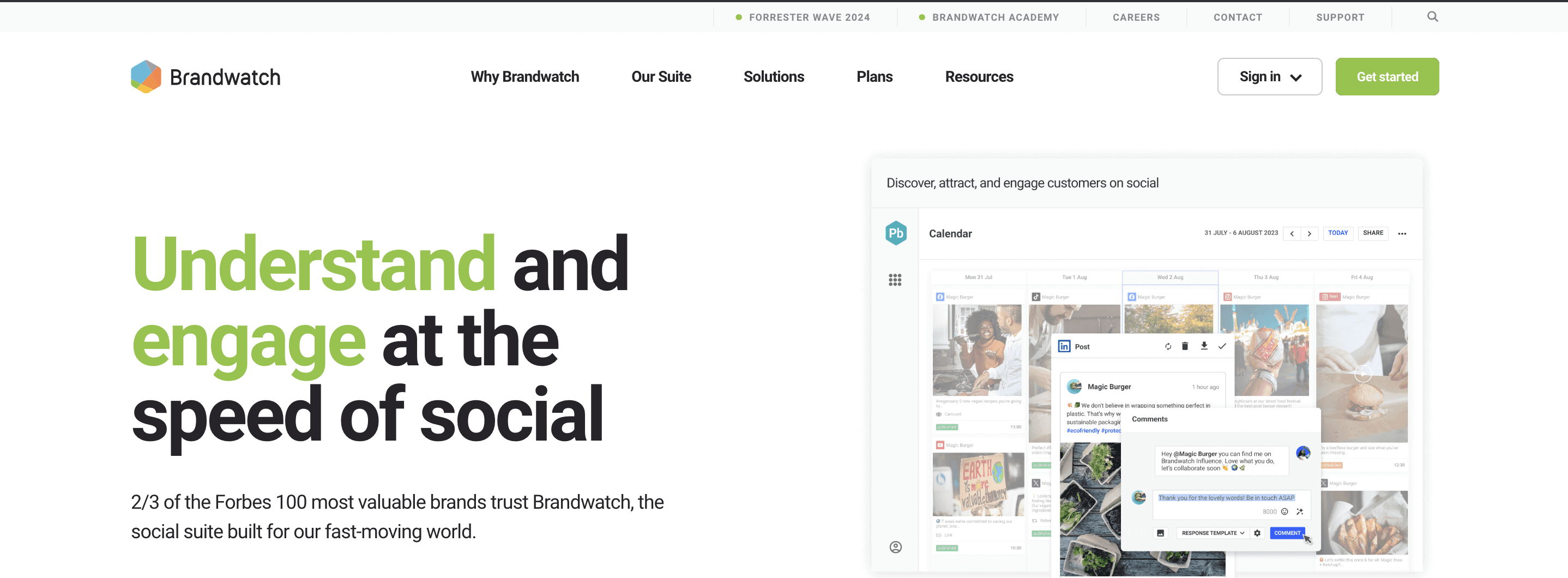
Brandwatch is a social media analytic tool that tracks billions of daily conversations, including blogs, news, forums, videos, Twitter, reviews, images, Facebook, etc., allowing brands and companies to understand consumer insights, trends, influencers, and brand perception.
How does it work?
Crawl
Brandwatch obtains content using proprietary web crawler technology that crawls a list of sites it covers. It searches through more than 80 million pages every day.
Analyze the pages
Indexing: The search index technology puts the contents in the index so the client can search them by words.
Sentiment analysis: Brandwatch uses natural language processing technology to conduct sentiment analysis. It is a mathematical model that models linguistic features that indicate sentiment. On top of that, there’s a rule-based process to help the software better understand how context can affect sentiments. As language evolves, the dictionary machines use to comprehend sentiment will continue expanding.
Influence science: Brandwatch Influence Score measures an individual’s ability to generate engagement and amplify messages.
Data storing: Data is stored in 3 technologies. A traditional database stores information about the page, repository storage keeps the page's actual content, and a search index puts content into an index for easy reference.
Matching against quires
Clients can use the Brandwatch dashboard to access relevant data presented visually to understand their marketing measurements, competitor activities, and trends.
Value Creation
Brandwatch creates client value through real-time tracking, authentic consumer insights, and influencer identification.
Real-time tracking
Unlike the traditional marketing tracking method, where reports are provided every 1-3 months, depending on subscription, Brandwatch offers real-time client tracking through the self-service dashboard. The client can see brand performances that refresh daily and optimize campaigns accordingly.
Authentic consumer insights
In the past, brands and companies get consumer insights through extensive and expensive consumer research, where the geography, sample size, and research topics are limited. With Brandwatch, brands can learn from organic conversations about themselves from all over the Internet. Not only can brands get access to the bottom-up, authentic voices of the mass consumer, but they also save time, money, and resources on market research.
Influencers identification
Previously, companies sought influencers to endorse their brands on PR platforms and social media, which sometimes seems forced and can be quickly ignored as “advertisement”. With Brandwatch, brands can now identify people already talking about the brand and reach out to them as influencers authentically and cost-effectively.
Brandwatch Price Plans
Brandwatch doesn't publish a straightforward pricing structure on their site. Instead, they offer custom pricing based on your unique needs, such as the number of users and data access. Reports suggest that Brandwatch's monthly pricing can range from $800 to $3,000, depending on your chosen features. This high cost makes it more suitable for large enterprises with significant budgets.
Related Reading
• How to Keep Up with TikTok Trends
• How to Find Trending Topics on YouTube
• How to Find Trending Topics on Instagram
• How to Find Trending Topics on TikTok
• How to Use Google Trends for YouTube
12 Best Brandwatch Alternatives for Social Media Analysis
1. Virlo: AI-Driven Insights for Short-Form Content Success
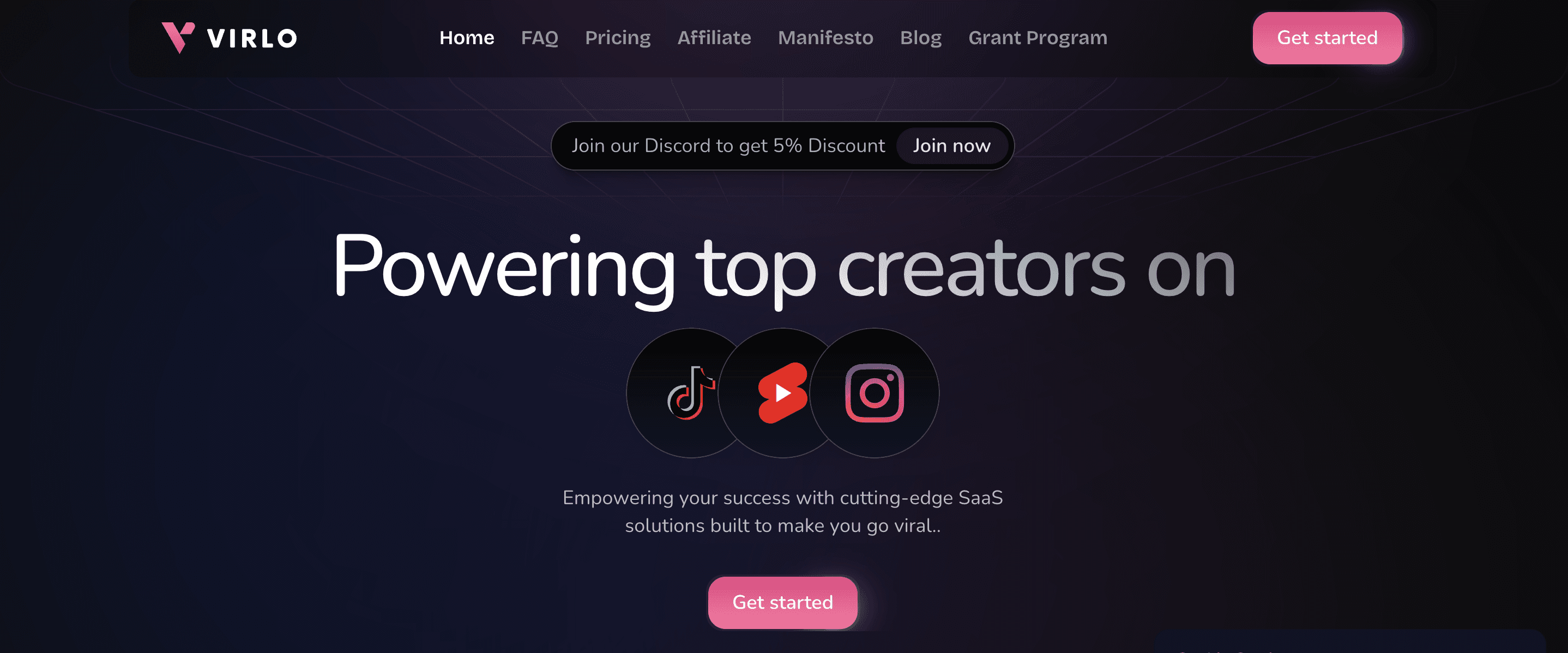
Virlo specializes in allowing short-form content creators to use AI-based trend analysis to help them crack the code of virality. The platform combines creator insights with advanced analytics to identify winning content patterns, optimal posting times, and successful audio/video combinations that help your content stand out in today's fast-moving social landscape.
Perfect for independent creators looking to build a sustainable side business, Virlo takes the guesswork out of content strategy. Whether you're just starting or looking to optimize your existing content, Virlo helps you navigate the ever-changing algorithms to increase your chances of going viral.
2. MeetEdgar: Effortless Evergreen Social Media Scheduling
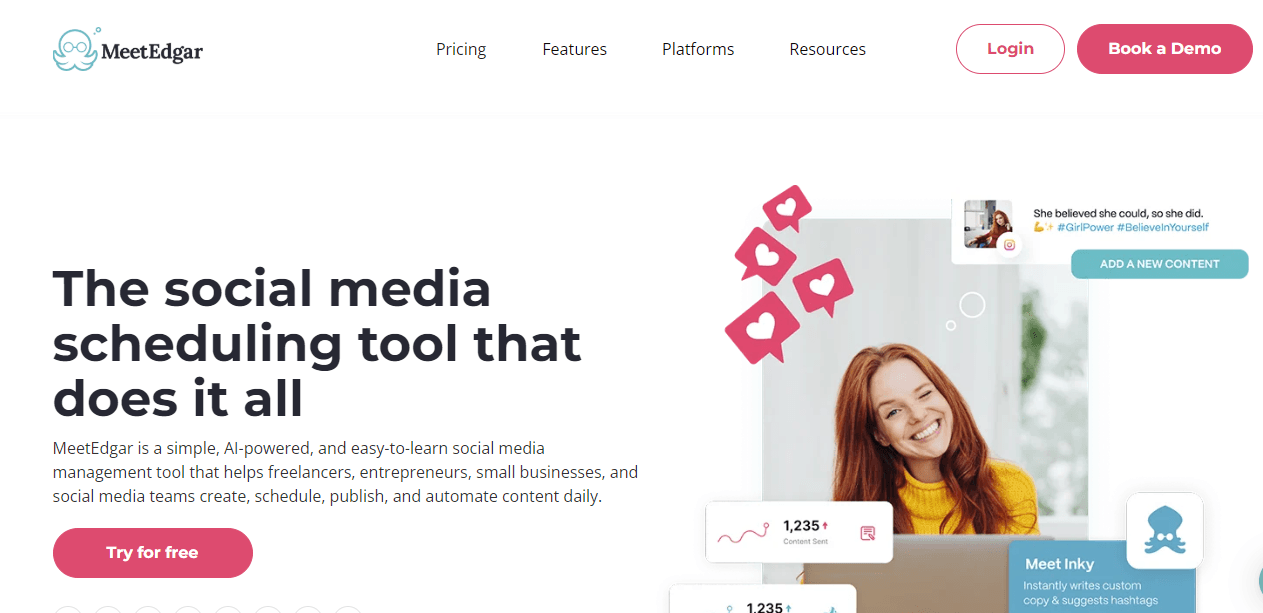
MeetEdgar is a popular social media automation tool for its evergreen scheduling capabilities. Users can upload all their evergreen content in one place with its limitless library option. Once you set the weekly automation, MeetEdgar auto-schedules posts from this library when you are caught up with scheduling daily content. However, the tool only supports five social media platforms: Facebook, Instagram, Pinterest, LinkedIn, and Twitter.
Pros
Automatically schedules evergreen posts if your posting queue is empty.
There's category-based scheduling so you can group your content according to relevance.
You can do A/B testing and monitor engagements.
Cons
You can't shuffle posts in your scheduled queues.
There's no social inbox as of now.
It doesn't support TikTok yet.
3. Mention: Track Your Brand's Online Reputation
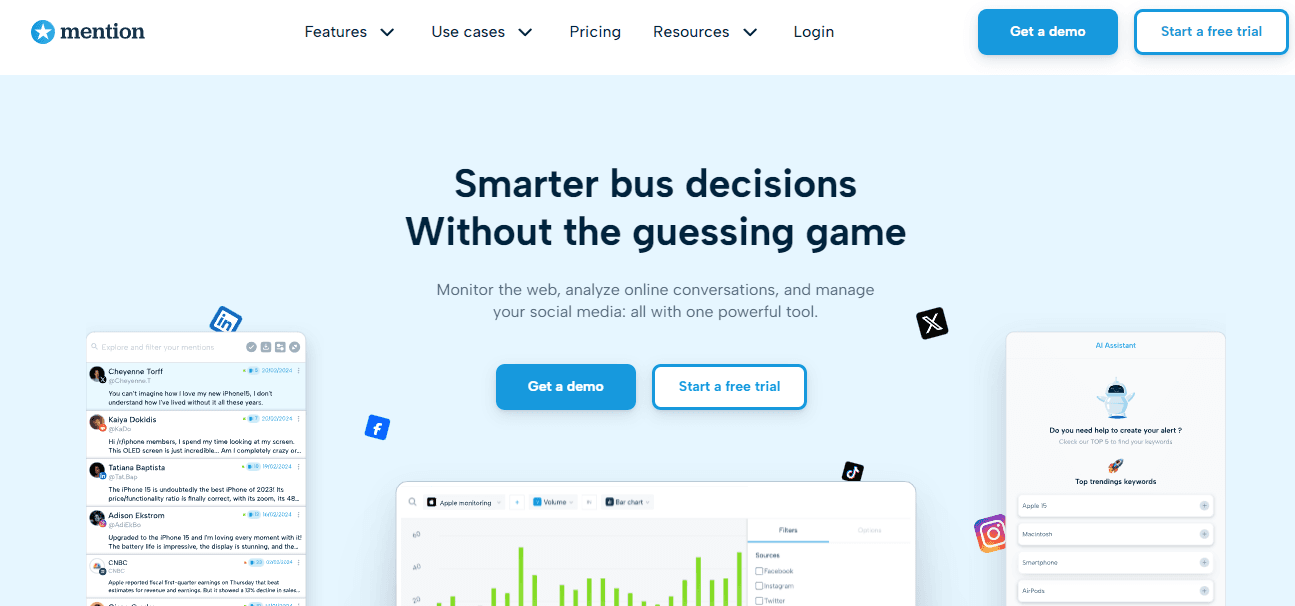
Mention is a social listening tool that allows you to track over a billion data sources across the web, including Twitter, Facebook, and Instagram, and create and save filters to find what you’re looking for easily. One of the best social listening tools, Mention enables brand marketers and digital marketing agencies to conduct in-depth sentiment analysis, track mentions of your brand’s social media mentions or any topic for up to two years, and set up alerts in case of any unusual activity.
Pros
Track whenever you get mentioned to understand brand reputation with real-time alerts and social listening features.
A comprehensive social listening tool with analytics and filters to deep dive into a competitor, brand, product, or industry-level topic.
Schedule detailed reports for different stakeholders to receive them in email periodically.
Engage with your audience across major social media platforms (such as Twitter, Instagram, and Facebook) and draft, schedule, and publish posts from multiple channels.
Cons
Does not capture historical data after the creation of a Boolean search.
Misses out on predictive analytics tool.
4. PromoRepublic: A Solid Choice for Local Social Media Marketing
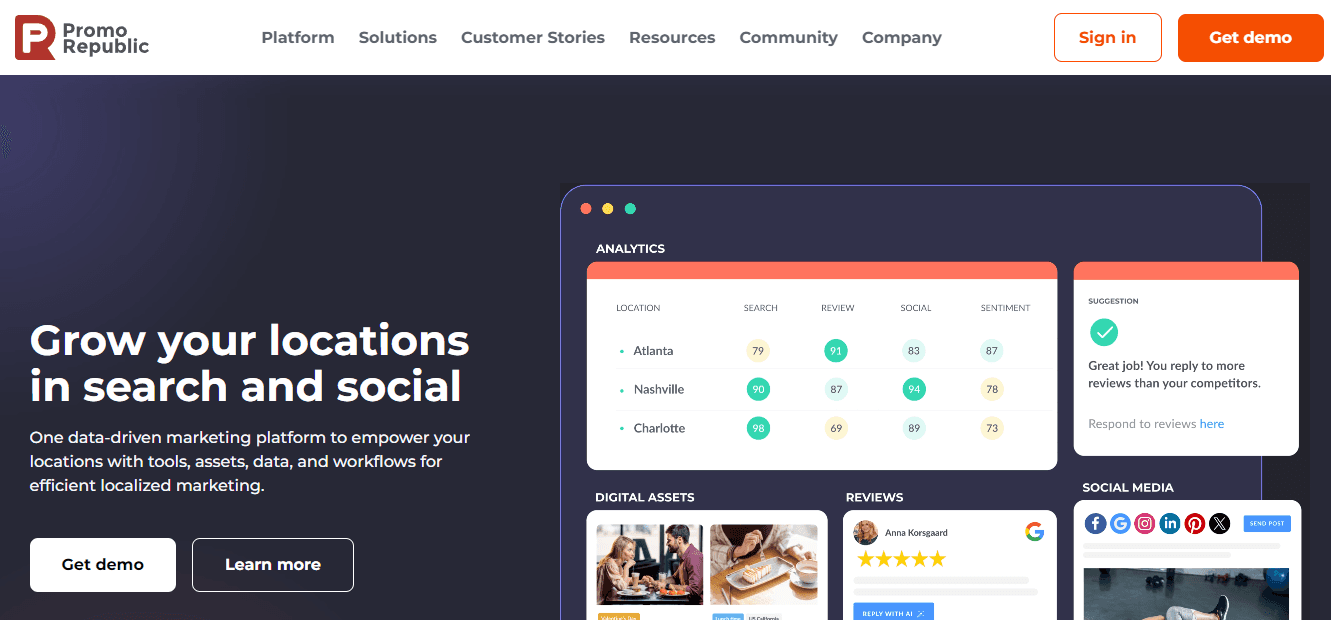
PromoRepublic is a new Brandwatch competitor with an in-built graphics editor, an all-in-one social inbox, and a content library. It is best suited for teams that aim for local and global marketing ventures. From a single dashboard, get a snapshot of local search, social media performance, content marketing, and brand reputation. It ensures that your branding stays consistent throughout and follows all the guidelines before going live.
Pros
It has pre-designed posts if you are running short of ideas.
Schedule content in different time zones to attract global and local audiences.
Its reporting capability is decent.
Cons
It lacks an in-depth analysis of crucial metrics.
Users have complained that the platform is buggy.
5. Agorapulse: Your All-in-One Social Media Management Solution
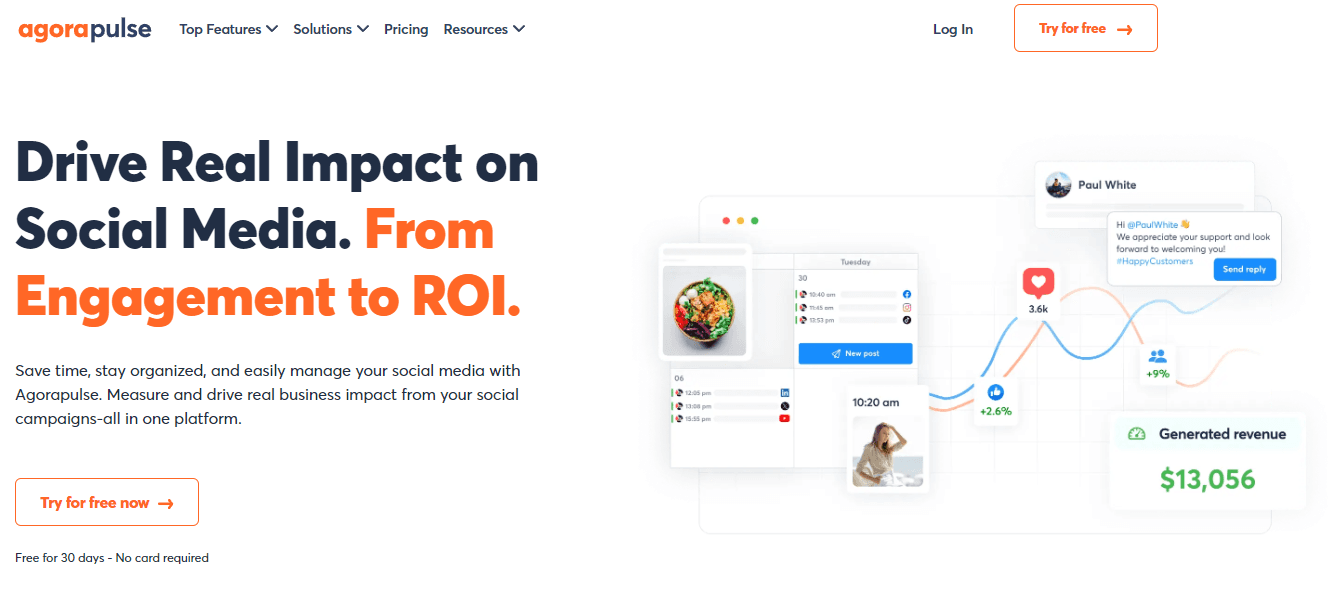
Agorapulse is an alternative to Brandwatch that allows marketers to take complete control of their social media management. With an intuitive publishing interface, social listening tools, and insightful analytics, Agorapulse ensures you never miss any mentions of your brand, be it from your audience or industry peers.
Pros
Manage your social media, publishing, reporting, social media monitoring, and team collaboration from Agorapulse’s unified social inbox.
Access to Agorapulse social listening tools over the mobile app on Android and iOS.
Project management features to put your publishing workflows in place, share notes, track action items, and assign the content to be approved.
Cons
Inability to export scheduled posts for client sharing.
The character limit is set to 300 characters for LinkedIn posts, while the platform itself allows the use of more characters.
6. Buffer: The Simple Social Media Scheduling Tool
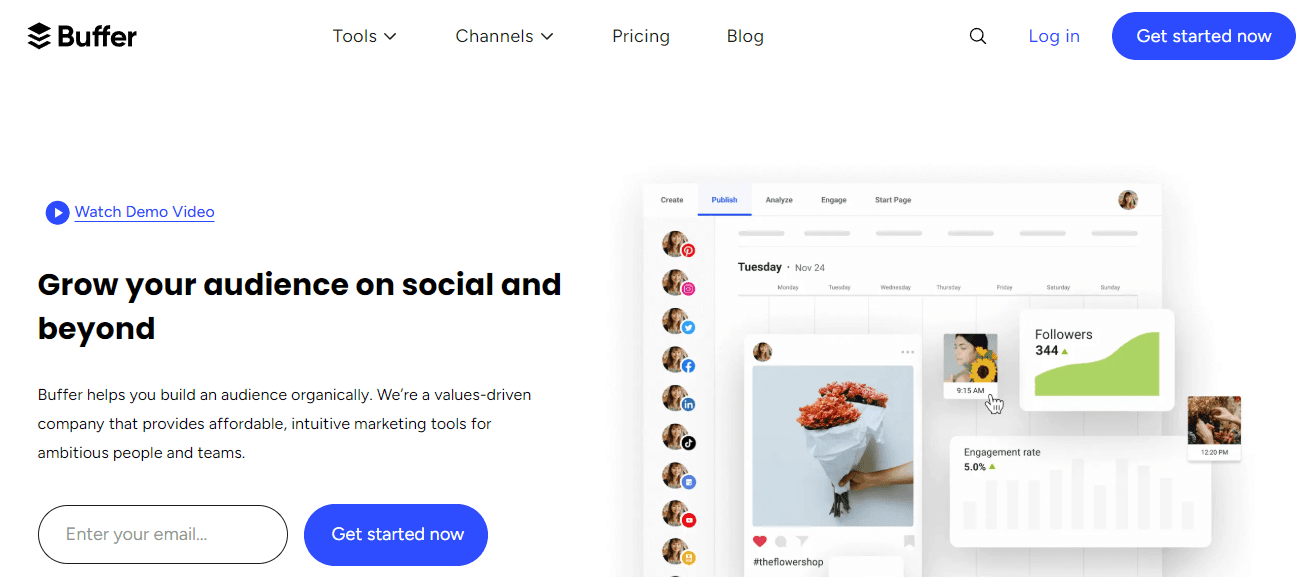
Buffer is yet another entry in the list that has won the trust of aspiring marketers. The first noteworthy thing about it is the WordPress integration that lets you market your blog as soon as you publish it. Buffer is an easy-to-use tool that simplifies the entire nitpicking process of social media management. It also provides its users with a free plan. Though it is good to start with, the free plan does possess loads of limitations. Hence, brands have to get their paid version.
Pros
The interface is super clean and user-friendly.
Customize your posts as per each platform’s specifics before sharing them.
Buffer provides its users with extensions and mobile apps.
Cons
The content curation feature is missing, vital to social media management tools.
Basic features are available as add-ons; if you opt for all, the final price becomes hefty.
Team collaboration features are also lacking.
7. Digimind: Real-Time Social Media Listening Tools
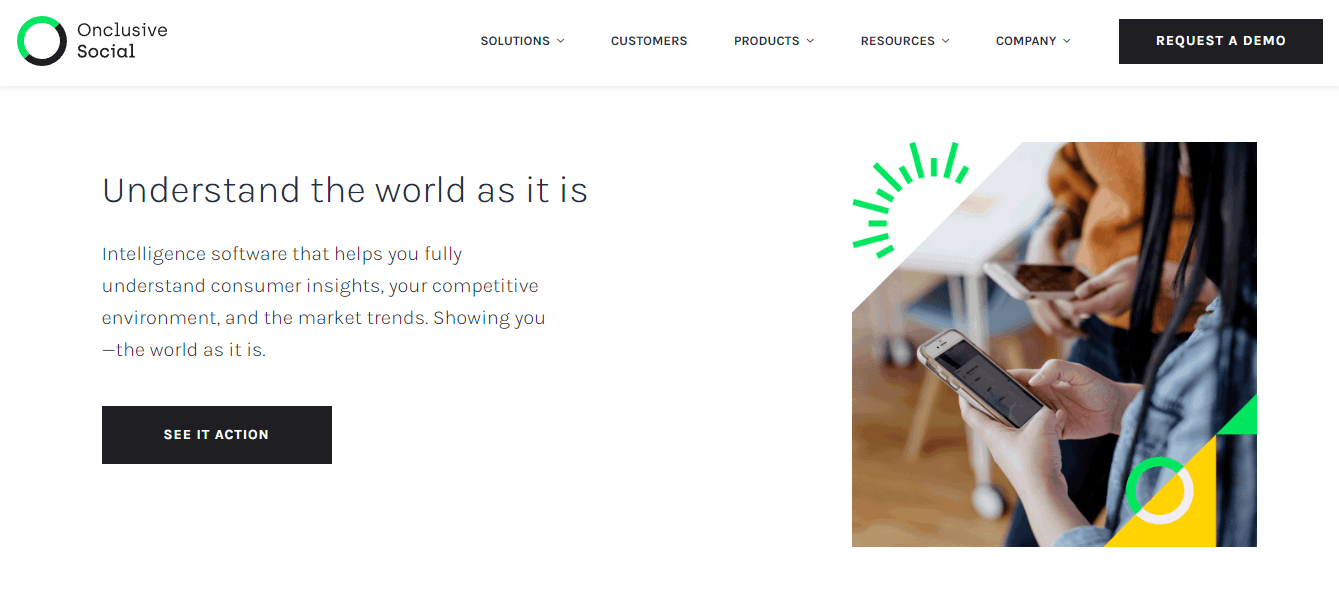
How easy would your life as a marketer or brand owner be if you could be on top of customer conversations on different social media channels in real time? Digimind’s social listening tools provide you with a comprehensive understanding of your audience and your competitors’ social posts.
For example, an online food delivery startup would use social listening tools like Digitmind for their social media marketing teams to monitor social conversations on Facebook and Instagram and create a marketing campaign based on viral trends. This customer data also helps identify gaps in customer experience and expectations.
Pros
AI-powered engine, AI Sense, helps with automated curation and recommended actions for marketers.
Digimind Social Analytics to analyze and benchmark as many social accounts as you want.
The proprietary Top Reputation module enables you to follow what your customers want to know about your brand, products, and those of your competitors.
Create reports using Digimind Social’s predesigned social media templates to evaluate key metrics.
Cons
The UI is not easy to use and requires training to understand the platform.
The depth of the data isn’t comprehensive.
8. StatusBrew: Engage Your Audience Effectively
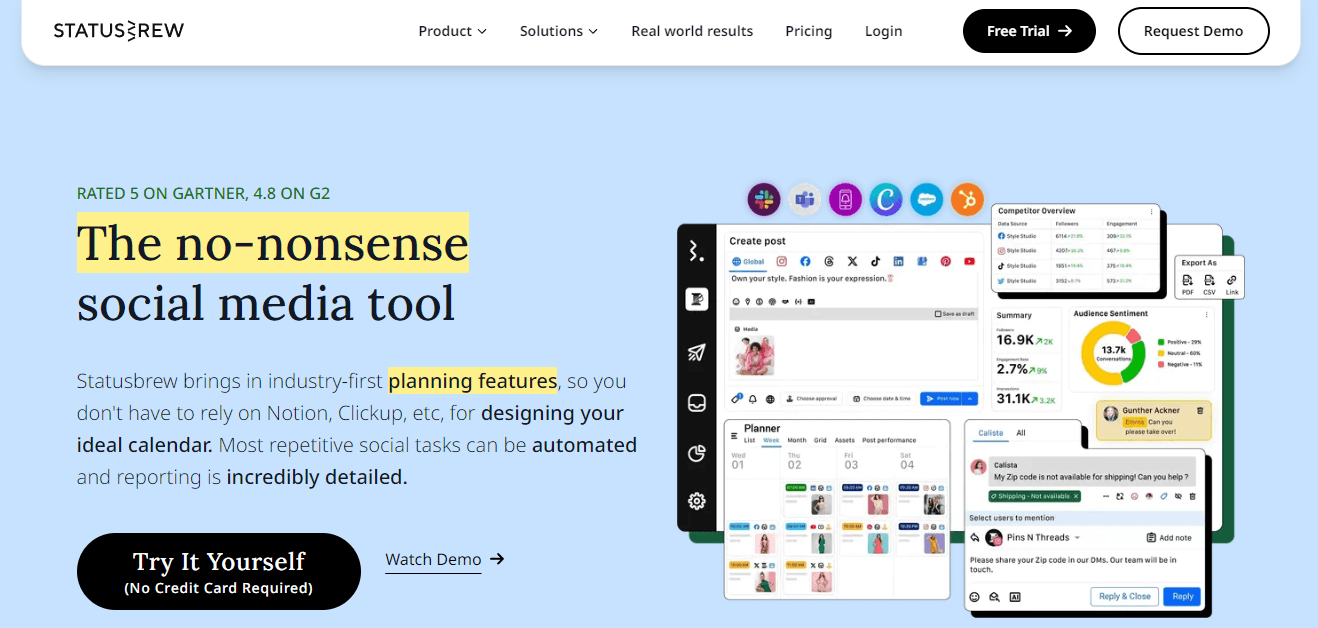
Statusbrew lets you interact with your customers on the go. Respond to messages, conversations, comments, and more from one place. The tool enables you to manage reviews apart from branded content, making it a suitable alternative to Brandwatch. Like other social media tools, Statusbrew also schedules content in a timely fashion and gets you covered. Once shared, you can access actionable insights about audience demographics and engagement.
Pros
It has hashtag search and team collaboration features.
It integrates with valuable tools like Slack, Bitly, Zapier, Mailchimp, etc.
It provides enterprise-grade security with multiple authentication and authorization processes.
Cons
The learning curve is on the steeper side.
The interface is slow at times and takes time to respond.
It only supports a few social media channels.
9. Emplifi: Social Media Listening Reimagined
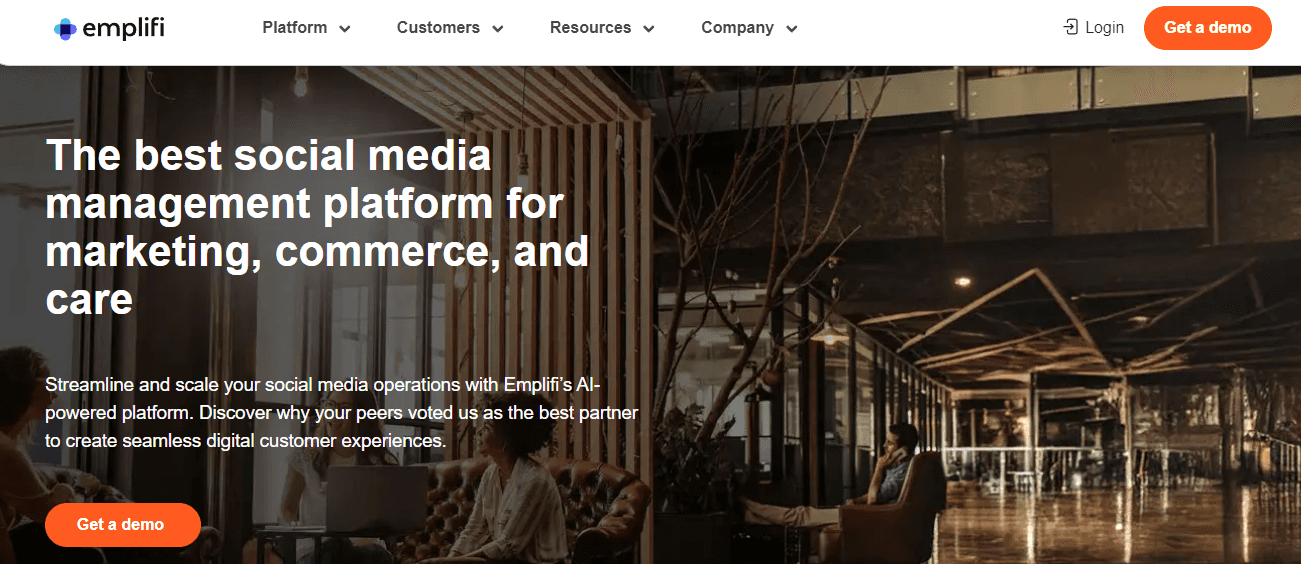
Emplifi’s social listening tools offer content creation and publishing, analytics, UGC, influencer marketing, community management, live commerce, reputation management, and care.
Pros
Receive automated alerts for sudden changes and anomalies in social media activity directly in the platform or via email.
Social listening features and a customizable dashboard with dynamic real-time key listening data and consumer insights.
AI tools for automated labeling, sentiment analysis, and advanced routing.
Cons
The tool doesn’t capture key metrics such as TikTok views for competitors or IGS swipe-ups.
It's cumbersome and frustrating to edit scheduled posts.
10. Sprout Social: The Feature-Packed Social Media Management Tool
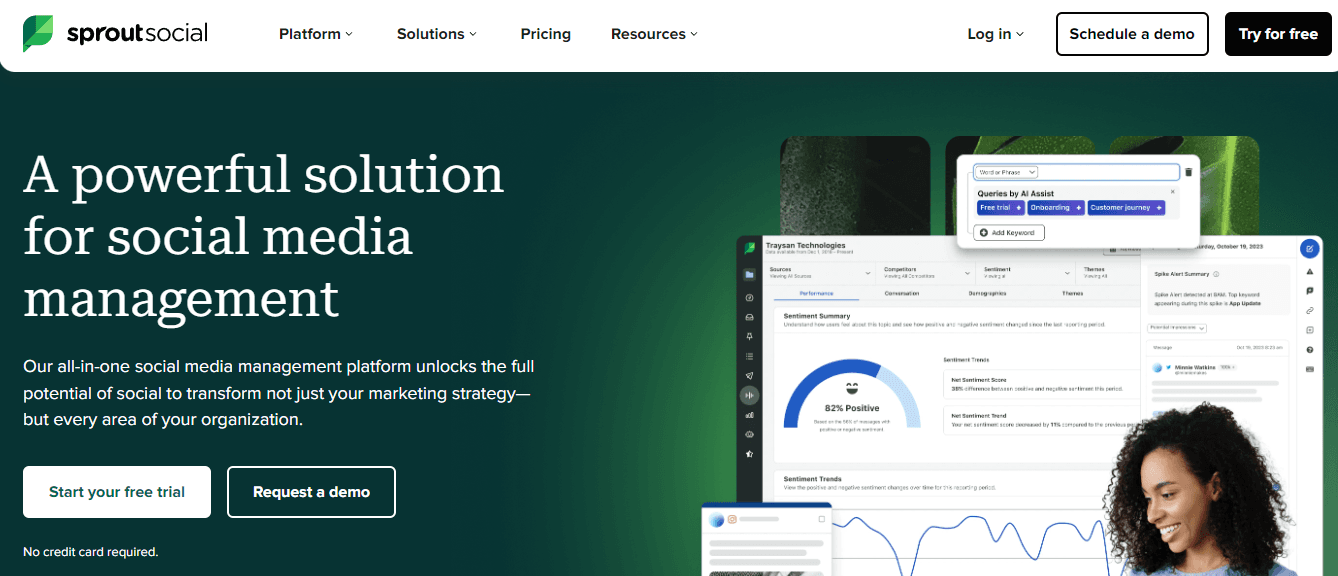
Sprout Social is one of the stifling tools that makes social media management a child’s play. You can run ads on multiple social media platforms and post daily content. Sprout Social improves its offering by providing features like social media listening, publishing, analytics, advocacy, and engagement. It also has a social CRM that keeps track of all conversations with customers on social media.
Pros
You can set up messenger chatbots.
It has several valuable integrations that make your work even more smooth.
Its analytics feature is terrific.
Cons
It is an expensive tool.
The social inbox isn’t so intuitive.
11. YouScan: Visual Insights for Social Media Listening
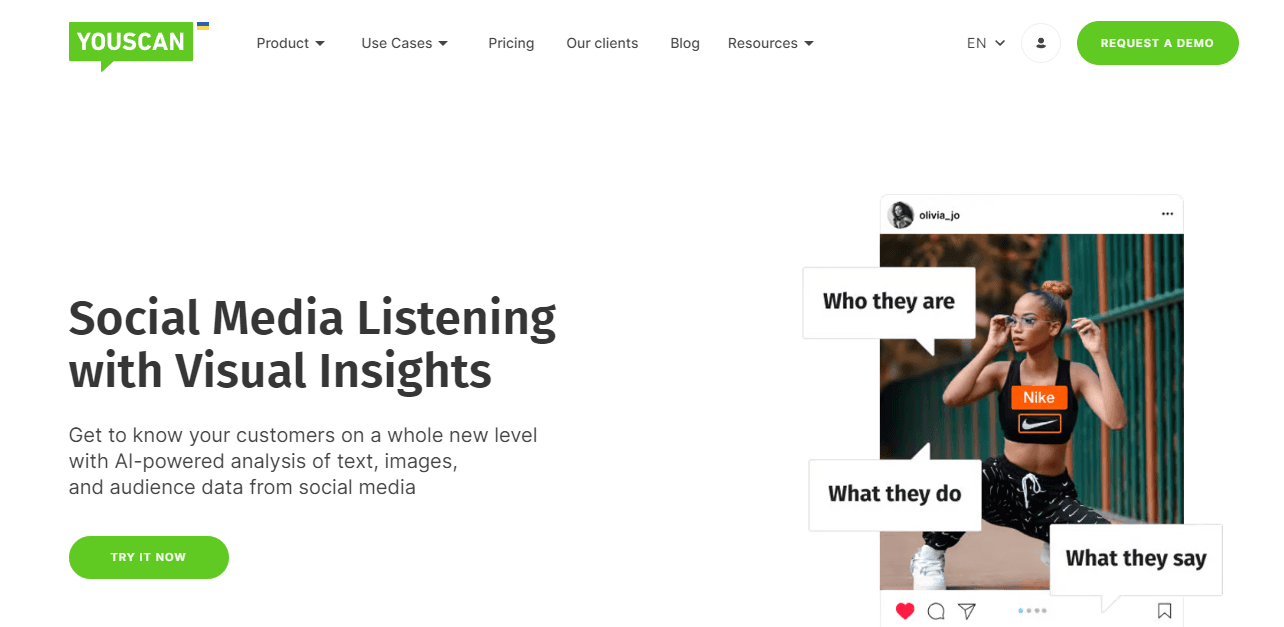
YouScan is an AI-powered social media listening tool with image recognition technology, helping businesses analyze consumer opinions, discover actionable insights, and manage brand reputation. Case in point: suppose a skincare company is looking to understand how customers perceive the brand, and traditional research methods aren’t cutting it. A social listening tool such as YouScan helps the brand get feedback based on social conversations, track untagged mentions, and include user testimonials in their social media promotions for the best results.
Pros
YouScan’s AI-powered Visual Insights detects logos, objects, scenes, activities, and demographic information on images.
Auto-categorization of incoming mentions and comments into categories such as compliments, praise, or complaints.
Custom tags for segmentation and filters to categorize mentions into categories.
Real-time alerts for spotting potential threats, detecting unwanted product use, and discovering negative visual mentions to protect your brand image.
Cons
Limited hashtags are available in the word cloud view.
Sentiment analysis is not always accurate.
12. Later: The Visual-Focused Social Media Scheduler
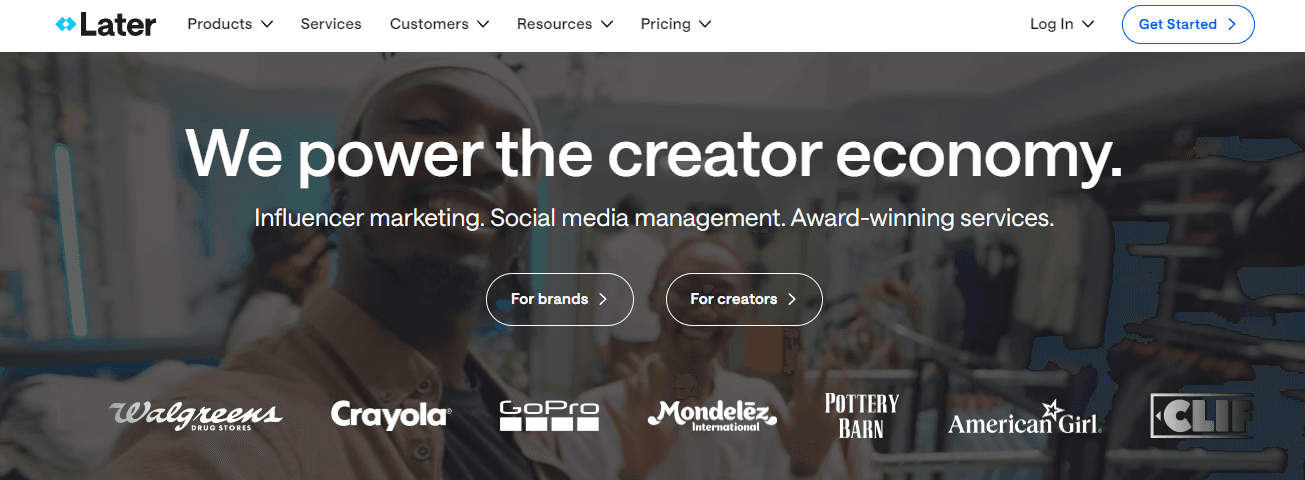
Later is a visual-focused alternative to Brandwatch that works best for Instagram and Pinterest. Though the tool supports other platforms, Later is a top-rated choice for marketers obsessed with visual marketing. The tool has splendid support for hashtags and keywords. It also provides Instagram-specific tools like Linkin.bio that lets you add your website link to the Instagram bio, hence driving more traffic and boosting sales. However, it is not an all-rounder. You must rely on additional tools to implement a better strategy for platforms like Twitter and LinkedIn.
Pros
Generate hashtags while scheduling posts.
Curate content for everyday posting.
Store every media in the asset library and plan your calendar visually.
Cons
You can’t bulk schedule posts.
Sharing text posts is a menace since it doesn’t let you proceed without an image or creative upload.
The platform isn’t intuitive and can be overwhelming at times.
Pros and Cons of Brandwatch

The Good Stuff: The Pros of Brandwatch
User-friendly
Brandwatch has a straightforward interface, making it easy for users to get started. The platform also has a helpful Boolean logic feature to help refine searches for precise results.
Efficient
Brandwatch quickly processes large amounts of data, converting it into graphs and other visuals within seconds. This efficiency reduces loading times and helps users get the information they need faster.
Reporting
Brandwatch offers various reporting capabilities to help users make sense of their data. There are custom reporting options and a measuring tool to help track performance over time.
Integrations
Brandwatch integrates with other marketing and analytics platforms, and it has an open API for custom integrations.
The Not So Good Stuff: The Cons of Brandwatch
Cost
Brandwatch can be pricey for small to midsize businesses, with a price range of $800 to $3,000.
Reporting limitations
Some users find that Brandwatch's reporting features are lacking compared to its price point.
Customer support
Some users have raised concerns about the responsiveness of Brandwatch's technical support.
Sentiment analysis
Some users find that Brandwatch's sentiment classifier is unreliable for nuanced classifications.
Related Reading
• How to Find Trending Hashtags on Instagram
• What Hashtags Are Trending on YouTube
• TikTok Trend Discovery
• Instagram Reels Trends
• Social Media Trend Tracker
• Google Trends Alternative
Go Viral with Virlo's Virality Analysis Tool
Virlo helps short-form content creators crack the code of virality through AI-powered trend analysis. Our platform combines creator insights with advanced analytics to identify winning content patterns, optimal posting times, and successful audio/video combinations that help your content stand out in today's fast-moving social landscape.
Perfect for independent creators looking to build a sustainable side business, Virlo takes the guesswork out of content strategy. We analyze the latest viral trends and help you understand when to post and what combinations of elements drive engagement. Whether you're just starting or looking to optimize your existing content, Virlo enables you to navigate the ever-changing algorithms to increase your chances of going viral. Go viral with Virlo's virality analysis tool.
Related Reading
• Hootsuite Alternatives
• TubeBuddy Alternative
• Cyfe Alternatives
• Feedly Alternative
• MeetGlimpse Alternative
• Exploding Topics Alternative
• Best Social Media Marketing Tools
Track Custom Data in Minutes
- Create your own custom data tracking based on your keywords
- Automate the process of collecting valuable business insights
- Leverage personal data to drive outcomes
12 Best Brandwatch Alternatives for Social Media Analysis
Discover 12 top Brandwatch alternatives for social media analysis. Find tools that fit your needs and budget with ease.
Nicolas Mauro
Updated: Feb 20, 2026

In the fast-paced world of social media, trends come and go in the blink of an eye—one moment, you're on top of the world, and the next, you're scrambling to keep up with the competition. When you think you've gotten a handle on things, the algorithm changes, leaving you with tons of content and no idea how to make it relevant again.
So, how to find social media trends? One of the best ways to boost your chances of staying on trend is to keep up with the trends. This is where a social media trend tracker comes in. You've come to the right place if you're looking for a solid Brandwatch alternative. This guide will help you identify some of the best alternatives to Brandwatch for tracking social media trends so you can get back to business and achieve your viral goals.
One particularly effective tool for tracking social media trends is Virlo's virality analysis tool. This tool helps you analyze existing content to uncover trends and patterns that can inform your future content strategy and help you go viral.
Table of Contents
What is Brandwatch?

Brandwatch is a social media analytic tool that tracks billions of daily conversations, including blogs, news, forums, videos, Twitter, reviews, images, Facebook, etc., allowing brands and companies to understand consumer insights, trends, influencers, and brand perception.
How does it work?
Crawl
Brandwatch obtains content using proprietary web crawler technology that crawls a list of sites it covers. It searches through more than 80 million pages every day.
Analyze the pages
Indexing: The search index technology puts the contents in the index so the client can search them by words.
Sentiment analysis: Brandwatch uses natural language processing technology to conduct sentiment analysis. It is a mathematical model that models linguistic features that indicate sentiment. On top of that, there’s a rule-based process to help the software better understand how context can affect sentiments. As language evolves, the dictionary machines use to comprehend sentiment will continue expanding.
Influence science: Brandwatch Influence Score measures an individual’s ability to generate engagement and amplify messages.
Data storing: Data is stored in 3 technologies. A traditional database stores information about the page, repository storage keeps the page's actual content, and a search index puts content into an index for easy reference.
Matching against quires
Clients can use the Brandwatch dashboard to access relevant data presented visually to understand their marketing measurements, competitor activities, and trends.
Value Creation
Brandwatch creates client value through real-time tracking, authentic consumer insights, and influencer identification.
Real-time tracking
Unlike the traditional marketing tracking method, where reports are provided every 1-3 months, depending on subscription, Brandwatch offers real-time client tracking through the self-service dashboard. The client can see brand performances that refresh daily and optimize campaigns accordingly.
Authentic consumer insights
In the past, brands and companies get consumer insights through extensive and expensive consumer research, where the geography, sample size, and research topics are limited. With Brandwatch, brands can learn from organic conversations about themselves from all over the Internet. Not only can brands get access to the bottom-up, authentic voices of the mass consumer, but they also save time, money, and resources on market research.
Influencers identification
Previously, companies sought influencers to endorse their brands on PR platforms and social media, which sometimes seems forced and can be quickly ignored as “advertisement”. With Brandwatch, brands can now identify people already talking about the brand and reach out to them as influencers authentically and cost-effectively.
Brandwatch Price Plans
Brandwatch doesn't publish a straightforward pricing structure on their site. Instead, they offer custom pricing based on your unique needs, such as the number of users and data access. Reports suggest that Brandwatch's monthly pricing can range from $800 to $3,000, depending on your chosen features. This high cost makes it more suitable for large enterprises with significant budgets.
Related Reading
• How to Keep Up with TikTok Trends
• How to Find Trending Topics on YouTube
• How to Find Trending Topics on Instagram
• How to Find Trending Topics on TikTok
• How to Use Google Trends for YouTube
12 Best Brandwatch Alternatives for Social Media Analysis
1. Virlo: AI-Driven Insights for Short-Form Content Success

Virlo specializes in allowing short-form content creators to use AI-based trend analysis to help them crack the code of virality. The platform combines creator insights with advanced analytics to identify winning content patterns, optimal posting times, and successful audio/video combinations that help your content stand out in today's fast-moving social landscape.
Perfect for independent creators looking to build a sustainable side business, Virlo takes the guesswork out of content strategy. Whether you're just starting or looking to optimize your existing content, Virlo helps you navigate the ever-changing algorithms to increase your chances of going viral.
2. MeetEdgar: Effortless Evergreen Social Media Scheduling

MeetEdgar is a popular social media automation tool for its evergreen scheduling capabilities. Users can upload all their evergreen content in one place with its limitless library option. Once you set the weekly automation, MeetEdgar auto-schedules posts from this library when you are caught up with scheduling daily content. However, the tool only supports five social media platforms: Facebook, Instagram, Pinterest, LinkedIn, and Twitter.
Pros
Automatically schedules evergreen posts if your posting queue is empty.
There's category-based scheduling so you can group your content according to relevance.
You can do A/B testing and monitor engagements.
Cons
You can't shuffle posts in your scheduled queues.
There's no social inbox as of now.
It doesn't support TikTok yet.
3. Mention: Track Your Brand's Online Reputation

Mention is a social listening tool that allows you to track over a billion data sources across the web, including Twitter, Facebook, and Instagram, and create and save filters to find what you’re looking for easily. One of the best social listening tools, Mention enables brand marketers and digital marketing agencies to conduct in-depth sentiment analysis, track mentions of your brand’s social media mentions or any topic for up to two years, and set up alerts in case of any unusual activity.
Pros
Track whenever you get mentioned to understand brand reputation with real-time alerts and social listening features.
A comprehensive social listening tool with analytics and filters to deep dive into a competitor, brand, product, or industry-level topic.
Schedule detailed reports for different stakeholders to receive them in email periodically.
Engage with your audience across major social media platforms (such as Twitter, Instagram, and Facebook) and draft, schedule, and publish posts from multiple channels.
Cons
Does not capture historical data after the creation of a Boolean search.
Misses out on predictive analytics tool.
4. PromoRepublic: A Solid Choice for Local Social Media Marketing

PromoRepublic is a new Brandwatch competitor with an in-built graphics editor, an all-in-one social inbox, and a content library. It is best suited for teams that aim for local and global marketing ventures. From a single dashboard, get a snapshot of local search, social media performance, content marketing, and brand reputation. It ensures that your branding stays consistent throughout and follows all the guidelines before going live.
Pros
It has pre-designed posts if you are running short of ideas.
Schedule content in different time zones to attract global and local audiences.
Its reporting capability is decent.
Cons
It lacks an in-depth analysis of crucial metrics.
Users have complained that the platform is buggy.
5. Agorapulse: Your All-in-One Social Media Management Solution

Agorapulse is an alternative to Brandwatch that allows marketers to take complete control of their social media management. With an intuitive publishing interface, social listening tools, and insightful analytics, Agorapulse ensures you never miss any mentions of your brand, be it from your audience or industry peers.
Pros
Manage your social media, publishing, reporting, social media monitoring, and team collaboration from Agorapulse’s unified social inbox.
Access to Agorapulse social listening tools over the mobile app on Android and iOS.
Project management features to put your publishing workflows in place, share notes, track action items, and assign the content to be approved.
Cons
Inability to export scheduled posts for client sharing.
The character limit is set to 300 characters for LinkedIn posts, while the platform itself allows the use of more characters.
6. Buffer: The Simple Social Media Scheduling Tool

Buffer is yet another entry in the list that has won the trust of aspiring marketers. The first noteworthy thing about it is the WordPress integration that lets you market your blog as soon as you publish it. Buffer is an easy-to-use tool that simplifies the entire nitpicking process of social media management. It also provides its users with a free plan. Though it is good to start with, the free plan does possess loads of limitations. Hence, brands have to get their paid version.
Pros
The interface is super clean and user-friendly.
Customize your posts as per each platform’s specifics before sharing them.
Buffer provides its users with extensions and mobile apps.
Cons
The content curation feature is missing, vital to social media management tools.
Basic features are available as add-ons; if you opt for all, the final price becomes hefty.
Team collaboration features are also lacking.
7. Digimind: Real-Time Social Media Listening Tools

How easy would your life as a marketer or brand owner be if you could be on top of customer conversations on different social media channels in real time? Digimind’s social listening tools provide you with a comprehensive understanding of your audience and your competitors’ social posts.
For example, an online food delivery startup would use social listening tools like Digitmind for their social media marketing teams to monitor social conversations on Facebook and Instagram and create a marketing campaign based on viral trends. This customer data also helps identify gaps in customer experience and expectations.
Pros
AI-powered engine, AI Sense, helps with automated curation and recommended actions for marketers.
Digimind Social Analytics to analyze and benchmark as many social accounts as you want.
The proprietary Top Reputation module enables you to follow what your customers want to know about your brand, products, and those of your competitors.
Create reports using Digimind Social’s predesigned social media templates to evaluate key metrics.
Cons
The UI is not easy to use and requires training to understand the platform.
The depth of the data isn’t comprehensive.
8. StatusBrew: Engage Your Audience Effectively

Statusbrew lets you interact with your customers on the go. Respond to messages, conversations, comments, and more from one place. The tool enables you to manage reviews apart from branded content, making it a suitable alternative to Brandwatch. Like other social media tools, Statusbrew also schedules content in a timely fashion and gets you covered. Once shared, you can access actionable insights about audience demographics and engagement.
Pros
It has hashtag search and team collaboration features.
It integrates with valuable tools like Slack, Bitly, Zapier, Mailchimp, etc.
It provides enterprise-grade security with multiple authentication and authorization processes.
Cons
The learning curve is on the steeper side.
The interface is slow at times and takes time to respond.
It only supports a few social media channels.
9. Emplifi: Social Media Listening Reimagined

Emplifi’s social listening tools offer content creation and publishing, analytics, UGC, influencer marketing, community management, live commerce, reputation management, and care.
Pros
Receive automated alerts for sudden changes and anomalies in social media activity directly in the platform or via email.
Social listening features and a customizable dashboard with dynamic real-time key listening data and consumer insights.
AI tools for automated labeling, sentiment analysis, and advanced routing.
Cons
The tool doesn’t capture key metrics such as TikTok views for competitors or IGS swipe-ups.
It's cumbersome and frustrating to edit scheduled posts.
10. Sprout Social: The Feature-Packed Social Media Management Tool

Sprout Social is one of the stifling tools that makes social media management a child’s play. You can run ads on multiple social media platforms and post daily content. Sprout Social improves its offering by providing features like social media listening, publishing, analytics, advocacy, and engagement. It also has a social CRM that keeps track of all conversations with customers on social media.
Pros
You can set up messenger chatbots.
It has several valuable integrations that make your work even more smooth.
Its analytics feature is terrific.
Cons
It is an expensive tool.
The social inbox isn’t so intuitive.
11. YouScan: Visual Insights for Social Media Listening

YouScan is an AI-powered social media listening tool with image recognition technology, helping businesses analyze consumer opinions, discover actionable insights, and manage brand reputation. Case in point: suppose a skincare company is looking to understand how customers perceive the brand, and traditional research methods aren’t cutting it. A social listening tool such as YouScan helps the brand get feedback based on social conversations, track untagged mentions, and include user testimonials in their social media promotions for the best results.
Pros
YouScan’s AI-powered Visual Insights detects logos, objects, scenes, activities, and demographic information on images.
Auto-categorization of incoming mentions and comments into categories such as compliments, praise, or complaints.
Custom tags for segmentation and filters to categorize mentions into categories.
Real-time alerts for spotting potential threats, detecting unwanted product use, and discovering negative visual mentions to protect your brand image.
Cons
Limited hashtags are available in the word cloud view.
Sentiment analysis is not always accurate.
12. Later: The Visual-Focused Social Media Scheduler

Later is a visual-focused alternative to Brandwatch that works best for Instagram and Pinterest. Though the tool supports other platforms, Later is a top-rated choice for marketers obsessed with visual marketing. The tool has splendid support for hashtags and keywords. It also provides Instagram-specific tools like Linkin.bio that lets you add your website link to the Instagram bio, hence driving more traffic and boosting sales. However, it is not an all-rounder. You must rely on additional tools to implement a better strategy for platforms like Twitter and LinkedIn.
Pros
Generate hashtags while scheduling posts.
Curate content for everyday posting.
Store every media in the asset library and plan your calendar visually.
Cons
You can’t bulk schedule posts.
Sharing text posts is a menace since it doesn’t let you proceed without an image or creative upload.
The platform isn’t intuitive and can be overwhelming at times.
Pros and Cons of Brandwatch

The Good Stuff: The Pros of Brandwatch
User-friendly
Brandwatch has a straightforward interface, making it easy for users to get started. The platform also has a helpful Boolean logic feature to help refine searches for precise results.
Efficient
Brandwatch quickly processes large amounts of data, converting it into graphs and other visuals within seconds. This efficiency reduces loading times and helps users get the information they need faster.
Reporting
Brandwatch offers various reporting capabilities to help users make sense of their data. There are custom reporting options and a measuring tool to help track performance over time.
Integrations
Brandwatch integrates with other marketing and analytics platforms, and it has an open API for custom integrations.
The Not So Good Stuff: The Cons of Brandwatch
Cost
Brandwatch can be pricey for small to midsize businesses, with a price range of $800 to $3,000.
Reporting limitations
Some users find that Brandwatch's reporting features are lacking compared to its price point.
Customer support
Some users have raised concerns about the responsiveness of Brandwatch's technical support.
Sentiment analysis
Some users find that Brandwatch's sentiment classifier is unreliable for nuanced classifications.
Related Reading
• How to Find Trending Hashtags on Instagram
• What Hashtags Are Trending on YouTube
• TikTok Trend Discovery
• Instagram Reels Trends
• Social Media Trend Tracker
• Google Trends Alternative
Go Viral with Virlo's Virality Analysis Tool
Virlo helps short-form content creators crack the code of virality through AI-powered trend analysis. Our platform combines creator insights with advanced analytics to identify winning content patterns, optimal posting times, and successful audio/video combinations that help your content stand out in today's fast-moving social landscape.
Perfect for independent creators looking to build a sustainable side business, Virlo takes the guesswork out of content strategy. We analyze the latest viral trends and help you understand when to post and what combinations of elements drive engagement. Whether you're just starting or looking to optimize your existing content, Virlo enables you to navigate the ever-changing algorithms to increase your chances of going viral. Go viral with Virlo's virality analysis tool.
Related Reading
• Hootsuite Alternatives
• TubeBuddy Alternative
• Cyfe Alternatives
• Feedly Alternative
• MeetGlimpse Alternative
• Exploding Topics Alternative
• Best Social Media Marketing Tools
Track Custom Data in Minutes
- Create your own custom data tracking based on your keywords
- Automate the process of collecting valuable business insights
- Leverage personal data to drive outcomes
Related Articles
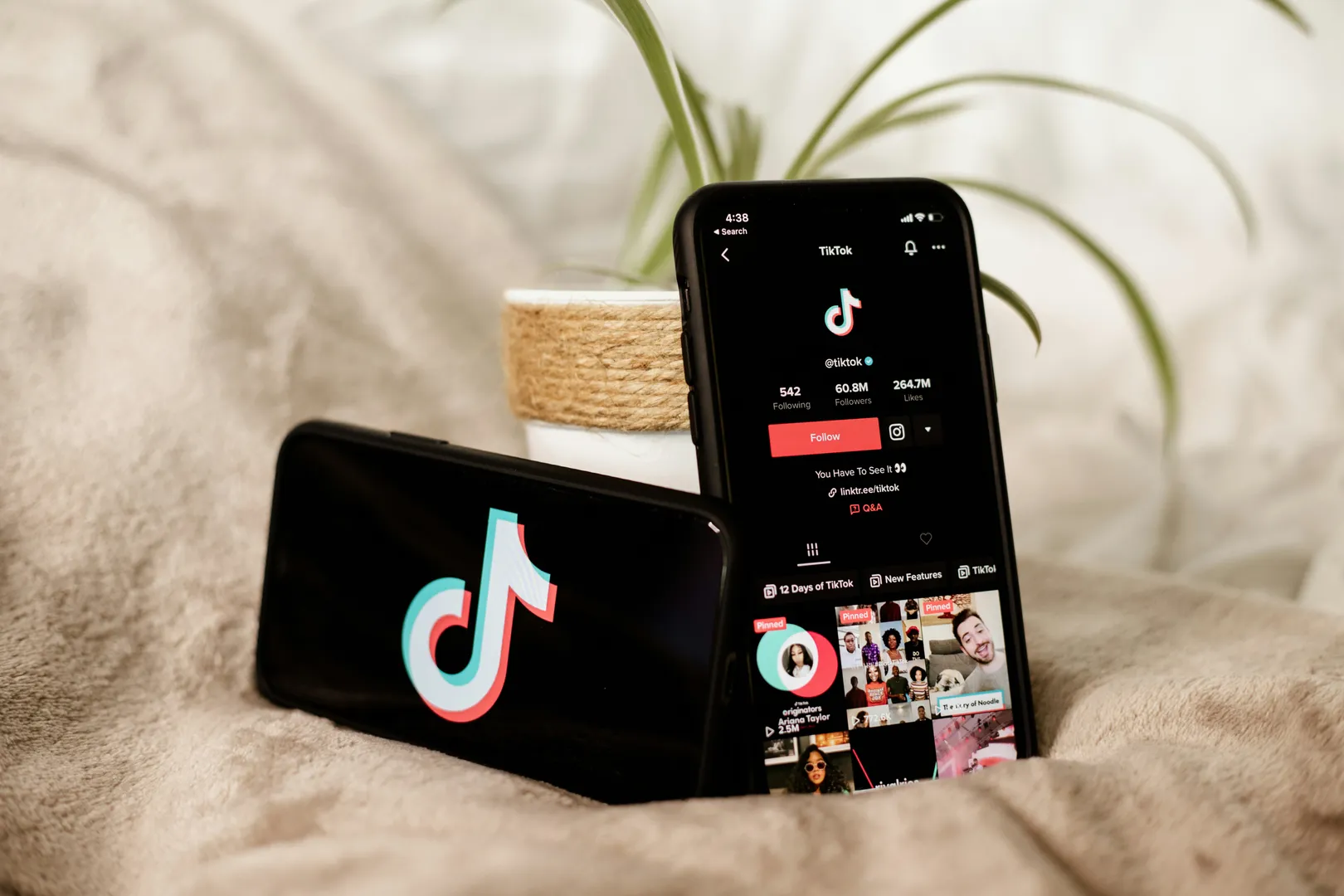
10 Useful Tips for TikTok Shop Marketing
Discover 10 proven tiktok shop marketing tips to boost sales, attract new buyers, and turn casual scrollers into loyal customers.

How Long Does It Take for a TikTok to Go Viral + 15+ Tips to Go Viral
Wondering how long it takes for a TikTok to go viral? Discover key timing insights and 15+ proven tips to boost your chances fast.

What Percentage Does Tiktok Shop Take
What Percentage Does Tiktok Shop Take? Learn how fee shifts and promo rates impact margins and pricing, with actionable insights from Virlo to boost profits.

Stop Guessing. Start Knowing.
Join thousands of digital entrepreneurs using data to take the guesswork out of capitalizing on trends.